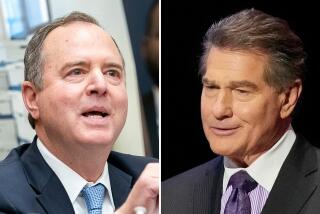Dueling Reform Plans Pit Hagel Against His Friend McCain
WASHINGTON â If the Senate passes campaign finance reform, it will almost certainly represent a major victory for a maverick Republican senator with a record of war heroism, considerable political ambitions and a penchant for piquing his colleagues.
The only question on Capitol Hill is, which senator?
Sen. John McCain of Arizona is the catalyst for the campaign finance debate underway on the Senate floor. But it is another GOP senator and Vietnam veteran, Charles Hagel of Nebraska, whose vision for reform might just prevail.
To the dismay of McCain, Hagelâs more modest proposal is gathering support and already has the tacit backing of the Bush White House.
The competition between these two lawmakers may well determine the course of campaign finance laws for years to come. It also represents an unusually striking example of how a single issue can alter political alliances.
Hagel and McCain are ordinarily the closest of allies and friends. Hagel was one of just four senators to endorse McCain for president in 1999, and campaigned for him vigorously against George W. Bush.
Now Hagel finds himself fending off accusations that he is Bushâs stalking horse, the presidentâs instrument for thwarting McCain.
Hagel, 54, dismisses such suggestions, saying he and McCain simply disagree on what ails the campaign finance system and how to fix it. Hagel points out that he first introduced his bill in October 1999, when he was co-chairman of McCainâs presidential campaign.
âI was wearing a McCain button,â he said in an interview. âThat should lay to rest the nonsense that I came up with this to get McCain.â
Nevertheless, that is what he may accomplish. Hagelâs measure gained some momentum Tuesday when four senators added their names as co-sponsors, bringing the total to 15. Perhaps more significant, the billâs backers include three Democrats. McCain has been counting on virtually unanimous support among Democrats for his bill to overcome the strong opposition from most Republicans.
At stake in the legislative contest are the millions of dollars in virtually unregulated âsoft moneyâ flowing into the coffers of both political parties--contributions viewed by critics as a corrupting influence in politics. The bill sponsored by McCain and Sen. Russell D. Feingold (D-Wis.) would bar federal candidates and the national parties from raising or spending soft money.
Hagelâs measure would cap annual soft money contributions to the national parties at $60,000 per donor. It would impose no restrictions on giving to state parties.
Hagel said he crafted his legislation to be âdown the middle, a bill that could attract bipartisan support.â During his opening remarks on the Senate floor Monday, he stressed his measureâs political viability as much as its merits, citing the importance of finding a law that âis constitutional and that President Bush will sign.â
Whatever the fate of Hagelâs bill, it has raised the profile of a first-term senator who has been through just one election, yet was on the short list of vice presidential candidates considered by Bush last year.
The Bush campaign was understandably intrigued by Hagelâs biography. He served in the infantry in Vietnam alongside his brother Tom, now a law professor at the University of Dayton. Each was wounded twice by enemy mines. Each had to care for the otherâs wounds, and each was awarded Purple Hearts.
The son of a lumberman, Hagel has had a series of seemingly unrelated careers. He earned a degree at the University of Nebraska and worked as a disc jockey and radio host. He is also a self-made millionaire, having helped launch a cellular telephone company, Vanguard Cellular Systems Inc., in the 1980s, and serving as a top executive at an Omaha investment firm, McCarthy & Co., a decade later.
Along the way, he also spent considerable time in Washington, including six years on the staff of then-Rep. John McCollister (R-Neb.). From 1977 to 1980, he headed government affairs for the Firestone Tire & Rubber Co. In 1980, he worked for Ronald Reaganâs 1980 presidential campaign, and a year later was named deputy administrator of the Veterans Administration.
He had never sought public office before his 1996 Senate race. He spent more than $1 million of his own money and trounced the then-governor of Nebraska, Ben Nelson, 56% to 42%.
In the Senate, Hagel serves on the Banking and Foreign Relations committees. He has earned a reputation as staunchly pro-business, advocating tax cuts, doubting the science of global warming and outranking every other senator in the U.S. Chamber of Commerceâs pro-business legislative scorecard.
But Hagel also has an independent streak that at times angers his partyâs leaders. In 1998, he challenged Sen. Mitch McConnell (R-Ky.), an ally of Senate Majority Leader Trent Lott (R-Miss.), for chairmanship of the National Republican Senatorial Committee. Hagel lost badly in the vote among Senate Republicans, 39-13.
Hagelâs political brashness, combined with his war record, have prompted comparisons to McCain. The two have been friends, Hagel said, since they crossed paths fund-raising for the Vietnam Veterans Memorial two decades ago. And the two men have their staffs working on a possible compromise to campaign finance reform.
But their differences on the issue run deep. McCain lambastes the Hagel bill for âlegalizingâ soft money and vowed Tuesday to continue âthe good fightâ against any effort that would allow soft money to survive.
Hagel argues that McCainâs approach is misguided, saying that banning soft money would merely weaken political parties and strengthen independent groups and special interests that will find other ways to influence politics with their money.
More to Read
Get the L.A. Times Politics newsletter
Deeply reported insights into legislation, politics and policy from Sacramento, Washington and beyond. In your inbox three times per week.
You may occasionally receive promotional content from the Los Angeles Times.










